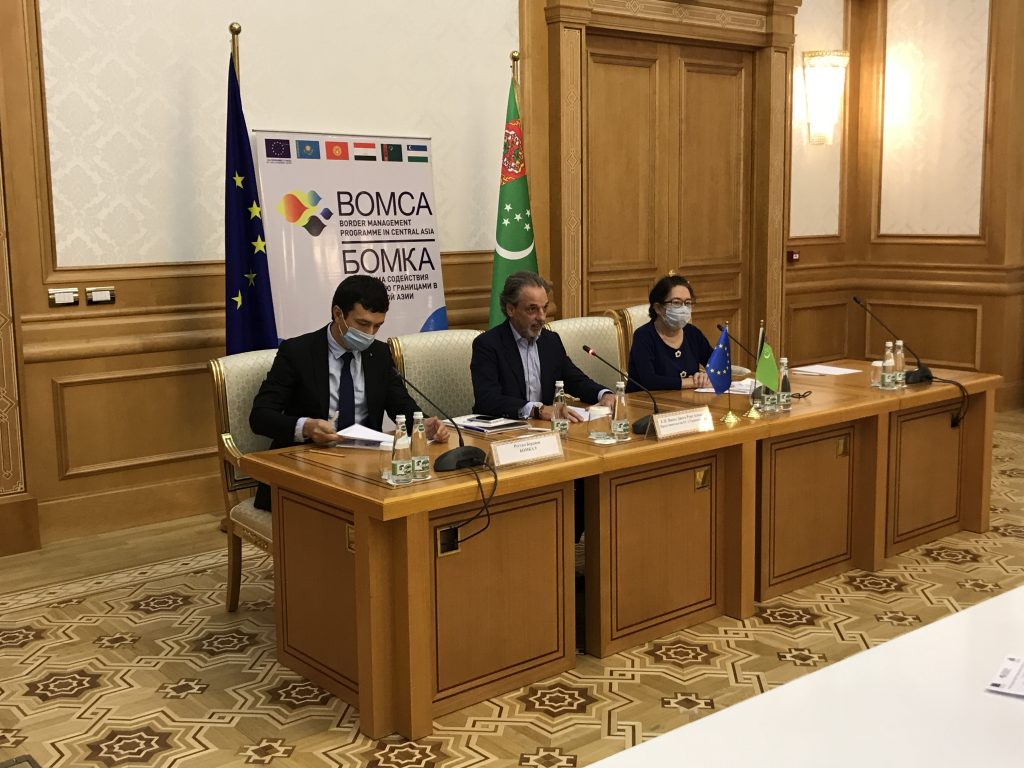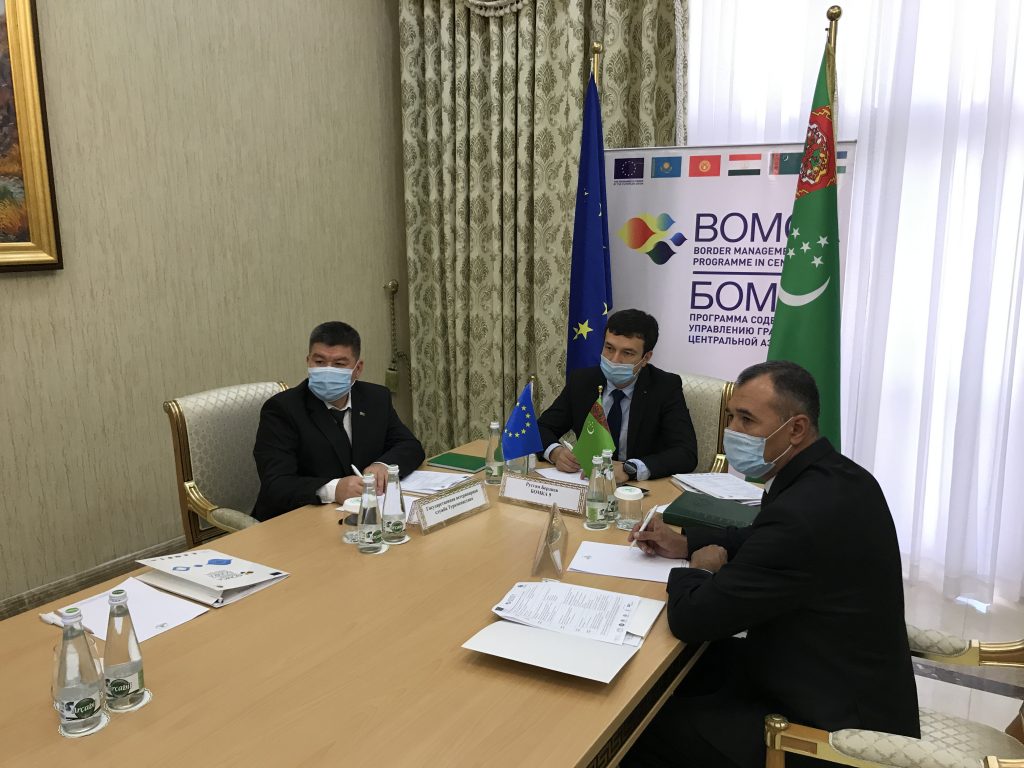Ashgabat, 15 September 2020
The 9th phase of the EU-funded Programme on Border Management in Central Asia (BOMCA) held its closing event to summarise the achievements from over the five years of its implementation.
The Regional Steering Group meeting and the Final Conference, held online, gathered over 100 high-level representatives of the BOMCA implementing Consortium, national border management agencies in Central Asia, EU Delegations, international organisations, and EU MS Embassies.
During the final event, BOMCA presented and disseminated the project’s results and tools for further strengthening border management, migration governance, and trade facilitation measures in the Central Asian region.
The first BOMCA operations in Central Asia began in 2003, and since then, BOMCA has been playing a positive role in promoting cooperation among border management agencies through the concept of Integrated Border Management, as well as helping the countries of the region to approximate the border control practices to international and European Union standards. The European Union allocated EUR 40.1 million to BOMCA so far for the whole period spanning from 2003 – 2020; out of this amount, EUR 6.6 million was assigned to its 9th implementation phase (2015 – 2020).
H.E. Ambassador Peter Burian, EU Special Representative for Central Asia, opened the conference. He welcomed the joint work with the governments of the region, stressing the importance of continued dialogue and partnership for resilience: “enhanced cooperation on effective border management against organised transnational crime is in the interest of both Central Asia and European Union”.
The keynote speakers from the State Border Guard of Latvia, Riga Technical University, and Customs Department of the Ministry of Finance of Lithuania reported on the capacity-building efforts, know-how exchanges, innovations, methodologies, and the working and training tools developed in the context of BOMCA Phase 9.
The Central Asian delegates from the MFAs, MoIs, Border Guard, Customs, Migration, and Phyto-Veto-Sanitary agencies shared insights into their experiences and good practices on progressing the project-produced outcomes in the areas of national law enforcement capacities, legal and regulatory instruments, border control procedures and risk management systems, among many others.
Moving forward, the European Union confirmed its readiness to pursue successful cooperation with the five countries of Central Asia in the framework of the next – 10th Programme Phase, which will also include the Islamic Republic of Afghanistan. The future Programme on Border Management in Central Asia and Afghanistan will fully take on board the principles of the new EU – Central Asia Cooperation Strategy, specifically by extending regional cooperation efforts to Afghanistan, not only to address security matters but also to promote cross-border connectivity/trade potential. To this end, the European Union made a pledge of EUR 21.75 million for the 2020-2025 period.
For more information, please visit website www.bomca-eu.org or contact at bomca@icmpd.org
Speech of Ambassador of the European Union to Turkmenistan, Mr. Diego Ruiz Alonso
Dear Ladies and Gentlemen,
The European Union and Turkmenistan have a longstanding relationship based upon strong mutual interests. The EU Strategies on Central Asia helped the EU and Central Asia to reach an unprecedented level of cooperation. Within the current strategy the EU will step up cooperation with Central Asia on modern integrated border management, extending regional cooperation efforts to Afghanistan. The EU will seek further ways to intensify cooperation with the region in the fight against organized crime, migrant smuggling, trafficking in human beings and trafficking in illicit drugs.
Launched in early 2003, the Border Management Programme in CA (BOMCA) has become one of the biggest regional assistance Programmes of the European Union in CA, supporting Governments in their pursuit of developing border management systems, migration governance, mobility and trade facilitation policies, and thus contributing to security and economic development in CA.
The current Phase 9 of BOMCA (2014-2020) is divided into three Components by thematic principle: Institutional development of border agencies, management of mixed migration flows at borders and adoption of trade facilitation regimes at borders. The promotion of Integrated Border Management (IBM) concept is a backbone of Programme activities.
Indeed BOMCA, has contributed towards supporting an integrated approach to border management, developing instruments to manage regular and irregular mobility/migration at borders, and introducing measures to facilitate licit cross-border trade. The programme has contributed to the visibility and reputation of the EU in Turkmenistan but also showed that bilateral cooperation can bring excellent results. The organisation of regional conferences, training courses and study tours has allowed involving Turkmenistan into regional cooperation, a priority of the EU actions in Central Asia.
Within the five year of implementation of BOMCA 9, the Programme had implemented in total 58 activities with the participation of representatives of the border agencies of Turkmenistan; over 480 state officials of beneficiary agencies were engaged and equipment to the State Border Service of Turkmenistan was provided. As per results of the implemented activities, 28 sets of the recommendations based on international standards were sent to beneficiaries through the Ministry of Foreign Affairs of Turkmenistan.
Today, we are officially closing the current phase of BOMCA. The Final Conference will present reports of the results achieved during national and regional activities in Central Asia in the period between 2015 and 2020, and the strategies for the next 10th Phase of the Programme for the period 2020/2025; with an EU contribution of EUR 21.75 M) it will, for the first time, also cover Afghanistan, which goes in line with the foreign policy of Turkmenistan advocating for the inclusion of Afghanistan in all initiatives projected for its Central Asian neighbours
BOMCA continues to be one of the main EU funded flagship programmes in the region devoted to border management, migration and trade facilitation. We appreciate very much the active cooperation of the Government of Turkmenistan and the efforts of the national partners and we expect this fruitful cooperation to be sustained during the next phase of the Programme. Thank you.
‘Answering questions of journalists, Mr. Ruiz Alonso insisted that the main element of the Regional Program BOMCA 9 is promoting regional cooperation as a way of achieving stability and peace. /// nCa, 16 September 2020 (in cooperation with EU-BOMCA)

